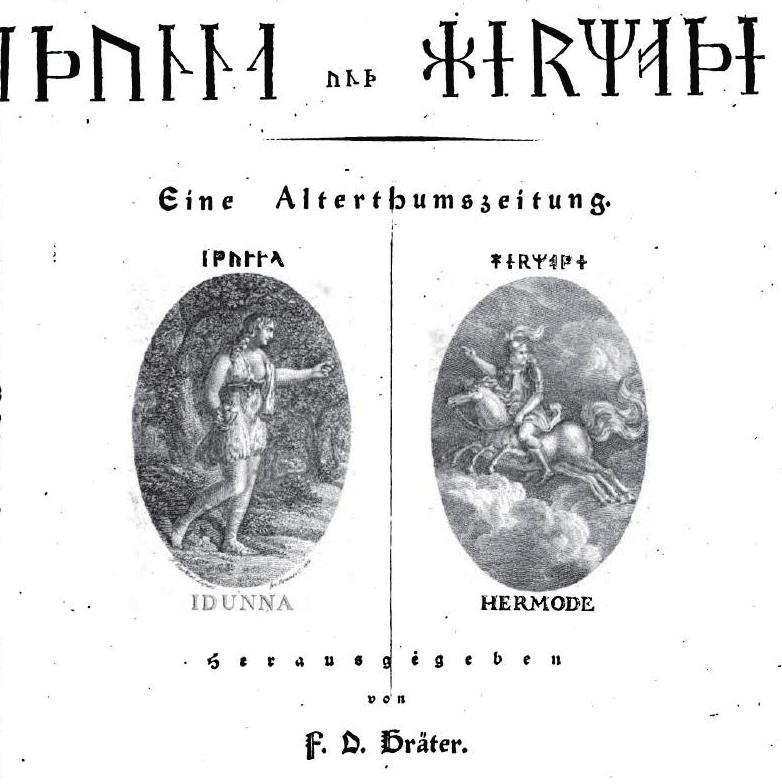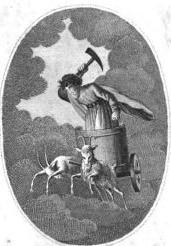Publisher of Idunna and Hermode
[HOME]
| Friedrich David
Gräter was born April 22, 1768 in Schwäbisch Hall,
Baden-Württemberg. He studied theology, philosophy and philology
at the University of Tübingen from 1786 to 1789, earning a Ph.D.
in 1789. Gräter began his teaching career by instructing Greek
and Hebrew at the Gymnasium in Schwäbisch Hall. In 1791, Gräter
founded the literary magazine
Bragur with his friend and
colleague Christian Gottfried Böckh, who died the following
year, leaving Gräter as editor. The Bragur published seven
volumes between 1791 and 1818. In 1804, Gräter took over as
director of the Gymnasium in Schwäbisch Hall, where he would
work until 1816. Bragur
was partially discontinued,
though an index to the first six volumes, prepared by folklorist
and librarian Karl Teuthold Heinze, was published in 1805. In
1812, Gräter founded another periodical, the weekly journal
Idunna und Hermode,
which ran successfully through 1816. In 1818, he transferred to
the Gymnasium in Ulm, where he also served as director. In 1827,
Gräter retired to Schorndorf, Württemberg, where he died on
August 2, 1830. |
| To see F.D. Gräter's works in their
historic context please visit Foreign Language Editions and Translations of the Poetic Edda |
Nordische Blumen ["Nordic Flowers"] (1789) [Googlebooks]
Nordische Blumen (1789) [Bavarian Digital Library]
Contains the following Eddic Poems in German Translation (pp. 91 ff.):
|
Thrymskvida |
Bragur: The Literary Magazine
of Nordic and German Antiquity
also called "Braga und Hermode" after 1796
| Bragur was founded in 1791 by German
folklorists Friedrich David Gräter and Christian Gottfried
Böckh, serving as co-editors. However, Böckh died in 1792,
leaving Gräter to carry on alone. In 1796, the magazine was
renamed Braga und Hermode, although it remained available under
its original title, each issue carrying two title pages until
its partial discontinuation in 1802. At that time, a total of
seven volumes had been published. Folklorist and librarian Karl
Teuthold Heinze published a register of the contents of the
first six volumes of Bragur (as well as the first three volumes
of Braga und Hermode) in 1805. The Critical Review: Or, Annals of Literature, Volume 2: ART. III.—Bragur. Vol. L—VII. 8vo. Leipsic. 1802. THIS periodical work, conducted by Frederic David Gräter, respects the mythological and philological antiquities of the Gothic nations; and contains a number of original antiquarian dissertations interesting to the whole north of Europe. A table of the contents will best explain its plan. Vol. I.—The Death-song of Regner Lodbrog—Dissertation on the Nornies—Translations from the older Edda—Dissertation on the Valkyries—Two Songs from the Havamal—Dissertation on Valhalla and its Heroes. Vol. II.—Werdomar's Dream—On the Spirit of northern Poetry and Mythology—On the Minstrels of the Germans—Tyrfing, a Romance—Cosmogony of the Edda—Halli and Leikner, a Romance —Small Poems—Notices of Manuscripts, and other philological Matter. Vol. III.—Sayers's Descent of Frea, from the English—On Druids, Bards, Skalds, Minstrels, Minnesingers, and Mastersingers (—Spirit of northern Poetry and Mythology continued—Tyrfing continued—Extracts from the Edda—Small Poems—Philological Varieties. Vol. IV. Spirit of northern Poetry and Mythology continued— On Mastersingers—Rhapsody on German Antiquity—On early Scottish Poetry, from the English of Tytler—On German popular Poetry—Miscellanies. Eric the Wanderer—Tyrfing continued—On the human Sacrifices of the ancient Germans—Miscellanies—On the Employment of northern Mythology by the Orator and the Painter—On the Conversion of the Followers of Odin to Christianity—Poems— On proper Names—Spirit of northern Poetry and Mythology continued. |
Vol. 1 (1791)
Vol. 1 (1791) [Bavarian Digital Library]
p. 312 Thryms-Quida
Vol 2 (1792)
p. 162 Baldrs Draumar
Vol 3 (1794)
Vol. ? (1798)
Vol 8
1809 Friedrich David Gräter
Lyrische Gedichte: nebst einigen vermischten

Idunna und Hermode:
A Journal for Northern Antiquity's Language, Art and Customs
| Established by folklorist Friedrich David Gräter in 1812, the journal Idunna und Hermode was a continuation of the work Gräter had produced for his previous periodical, the literary magazine Bragur, from 1791 to 1805. The new effort was published on a weekly basis until 1816, and was occasionally accompanied by a separately numbered Anzeiger, which contained announcements and book reviews. |
Volume 1-2 (1812)
Völundarkvida (begins PDF p. 127, split by issues)
Helgi Hjorvarthson (PDF p. 507)
Vol 1 No 1-23 [Bavarian Digital Library]
Volume 2 (1813)
Vol 2 No 1-20 [Bavarian Digital Library]
Vol 2 No 2-11 [Bavarian Digital Library]
Volume 3 (1814) No 1-47 [Bavarian Digital Library]
Volume 3-4 (1814-1815) [Bavarian Digital Library]
Litteraische Benlagen (1815)
Volume 5 (1816)
Vol 5 No 1-47 [Bavarian Digital Library]
Litterarische Benlagen (1816)
Friedrich David Gräter (1829)
Versuch einer Einleitung in die Nordische Alterthumskunde Volume 1
Later Journals Influenced by Gräter's Work:
IDUNA: A Journal for the Lover of Nordic Antiquity
Vol 7-8 (1817)
p. 3ff. Wafthrudnismal
Vol. 8 (1820)
Vol. 3 (1824)
Wolu-spa p. 3ff.
| Foreign Quarterly Review, Vol. 2 (1828): "The best of the Danish Annuals appears to be the Gefion, edited by a lady named Eliza Beyer, an actress on the Copenhagen boards. She is ably supported by some of the first names in Danish literature, and she also judiciously adorns her pages with unpublished pieces of the older poets of Denmark. This New-year’s Gift has the reputation of being thoroughly Danish in contents as well as in title. The latter is taken from Gefion, one of the Asyniers or goddesses of Northern Mythology, whom the reader of the poetic Edda will recollect that Loki, when at Æger’s banquet be is giving it to all the Aser round, twits with her amour with a certain “white swain,” who gained her love by the present of a necklace. The same Gefion it probably was who, when Gylfe, King of Sweden, gave her for her singing as much land as she could plough with four oxen in a day, ploughed up the isle of Zealand out of Sweden, and cast it into the sea, to the great gain of the Danish monarchy. Fru Beyer therefore could not have chosen a more suitable patroness for a Danish New-year’s Gift. The Swedish journal Idunna, it may be observed, is under the patronage of another Asynie of that name." |

Am Urdhs-Brunnen Vol. 1 (1881)
"At Urd's Well"